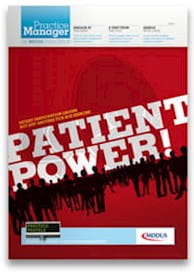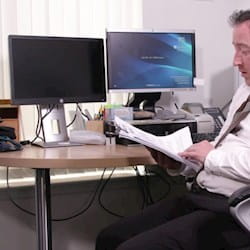Day one
A young mother attends a busy general practice in Sheffield worried about her sexual health after learning that her husband has been unfaithful. One of the GPs – Dr Y – examines the patient in the presence of a chaperone and takes two swabs (HSV and ECS) and a third ECS to test for chlamydia. The patient is asked to phone in for the results.
Day six
The patient phones into the surgery for her results and is put through to a practice nurse. The patient is informed that the tests revealed “no abnormalities” and there is “nothing to worry about”. She rings off feeling immensely relieved.
Day 118
The patient comes into the surgery complaining of an ingrown toenail. She sees Dr Y who asks how she got on with the antibiotic treatment for her chlamydia. The patient is shocked and upset, claiming that the practice had not informed her of any such diagnosis. Dr Y offers his sincere apologies and starts the patient immediately on oral antibiotics. Two days later an angry letter arrives at the practice from the patient expressing worries over her ongoing health and fertility and also threatening legal action if an adequate explanation is not forthcoming.
ANALYSIS/OUTCOME
THE practice undertakes an investigation to find out how the positive test result was missed and this reveals a flaw in the practice results handling system. It is routine policy at the practice to record test results against the date on which samples are taken and not the date on which results are received. On the day the patient phoned the results from only two of the swabs were available to the nurse so she communicated these results unaware of the pending chlamydia swab.
Two days later a positive result for chlamydia was received by the practice and highlighted to Dr Y. He gave specific instructions for the patient to be contacted with the result and to come into the practice to pick up a prescription for antibiotics. The nurse responsible for contacting the patient looked up her le on the computer system and saw that the patient had already been informed of the test results. The nurse assumed this was for all three swabs.
The uncollected prescription for antibiotics offered another opportunity to catch the error but it is practice policy for all prescriptions not collected after three months to be routinely destroyed without review.
The practice conducts a significant event analysis (SEA) in which the factors leading to the system failure are examined and recommendations are made to ensure the error is not repeated. Among the weaknesses identified is a lack of specificity in the electronic record system to clearly demonstrate the number of tests performed in a single patient interaction and a clear procedure for individual “patient informed” annotations for each test. It is decided that new guidelines must be drawn up for the IT system to ensure that individual abnormal results are flagged with an alert until reported as “informed test result”.
The SEA also highlights a need for better communication when tests are undertaken so that patients are informed of what tests are being undertaken and how long to wait before requesting results.
The analysis also prompts a re-evaluation of practice policy on uncollected patient prescriptions. It is decided that before destroying any uncollected prescriptions these will be returned to the prescribing GP for evaluation and possible patient follow-up or recall.
The practice contacts MDDUS to liaise over an appropriate written response to the patient’s letter of complaint. In the response the practice manager admits to the failings that lead to the missed test result and offers a sincere apology. She also states that the practice has learned from the incident and that steps have been taken to help prevent such errors in future. The practice also assures the patient that Dr Y is available to discuss any worries she might have over her long-term health and the need for referral to a gynaecologist.
KEY POINTS
- Ensure the practice has a fail-safe system for patient call-backs in abnormal results.
- Consider a policy of reviewing all uncollected prescriptions before destruction.
- Ensure patients are aware of what tests are being undertaken so they can ask for specific results.
Alan Frame is risk adviser with MDDUS Training and Consultancy
This page was correct at the time of publication. Any guidance is intended as general guidance for members only. If you are a member and need specific advice relating to your own circumstances, please contact one of our advisers.
Read more from this issue of Practice Manager

Save this article
Save this article to a list of favourite articles which members can access in their account.
Save to library


